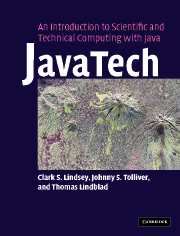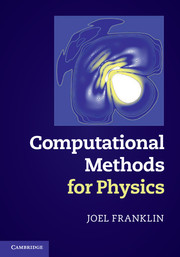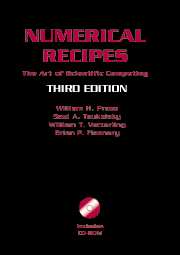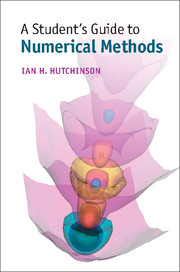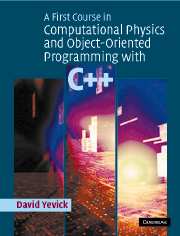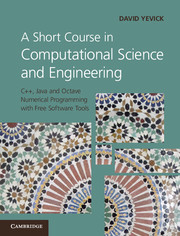
A Short Course in Computational Science and Engineering
C++, Java and Octave Numerical Programming with Free Software Tools
£30.99
- Author: David Yevick, University of Waterloo, Ontario
- Date Published: May 2012
- availability: In stock
- format: Hardback
- isbn: 9780521116817
£
30.99
Hardback
Other available formats:
eBook
Looking for an inspection copy?
This title is not currently available on inspection
-
Building on his highly successful textbook on C++, David Yevick provides a concise yet comprehensive one-stop course in three key programming languages, C++, Java and Octave (a freeware alternative to MATLAB). Employing only public-domain software, this book presents a unique overview of numerical and programming techniques, including object-oriented programming, elementary and advanced topics in numerical analysis, physical system modelling, scientific graphics, software engineering and performance issues. Compact, transparent code in all three programming languages is applied to the fundamental equations of quantum mechanics, electromagnetics, mechanics and statistical mechanics. Uncommented versions of the code that can be immediately modified and adapted are provided online for the more involved programs. This compact, practical text is an invaluable introduction for students in all undergraduate- and graduate-level courses in the physical sciences or engineering that require numerical modelling, and also a key reference for instructors and scientific programmers.
Read more- Presents the first unified treatment of Octave (MATLAB), C++ and Java together with numerical methods and physical applications
- All aspects of installation and implementation of the exclusively free software used in the book are summarised and the resulting techniques can be shared among different users in a group setting
- Material has been developed over 20 years of experience developing scientific programming courses for engineers and scientists and will benefit students and researchers in all areas of mathematics, engineering and pure and applied science
Reviews & endorsements
'… a very valuable, comprehensive reference for users of public domain key programming languages. Undergraduate and graduate students in physical sciences and engineering and working scientists will benefit from this short course on computational science.' Axel Mainzer Koenig, Optics and Photonics News (osa-opn.org)
See more reviews'I recommend this book as a fine all-in-one package of essentials for those who use computation in their scientific or engineering endeavors.' George Hacken, Computing Reviews
Customer reviews
Not yet reviewed
Be the first to review
Review was not posted due to profanity
×Product details
- Date Published: May 2012
- format: Hardback
- isbn: 9780521116817
- length: 280 pages
- dimensions: 252 x 192 x 17 mm
- weight: 0.75kg
- contains: 5 b/w illus.
- availability: In stock
Table of Contents
1. Introduction
2. Octave programming
3. Installing and running the Dev-C++ programming environment
4. Introduction to computer and software architecture
5. Fundamental concepts
6. Procedural programming basics
7. An introduction to object-oriented analysis
8. C++ object-oriented programming syntax
9. Arrays and matrices
10. Input and output stream
11. References
12. Pointers and dynamic memory allocation
13. Memory management
14. The static keyword, multiple and virtual inheritance, templates and the STL library
15. Creating a Java development environment
16. Basic Java programming constructs
17. Java classes and objects
18. Advanced Java features
19. Introductory numerical analysis
20. Linear algebra
21. Fourier transforms
22. Differential equations
23. Monte-Carlo methods
24. Parabolic partial differential equation solvers
Index.-
General Resources
Find resources associated with this title
Type Name Unlocked * Format Size Showing of
This title is supported by one or more locked resources. Access to locked resources is granted exclusively by Cambridge University Press to lecturers whose faculty status has been verified. To gain access to locked resources, lecturers should sign in to or register for a Cambridge user account.
Please use locked resources responsibly and exercise your professional discretion when choosing how you share these materials with your students. Other lecturers may wish to use locked resources for assessment purposes and their usefulness is undermined when the source files (for example, solution manuals or test banks) are shared online or via social networks.
Supplementary resources are subject to copyright. Lecturers are permitted to view, print or download these resources for use in their teaching, but may not change them or use them for commercial gain.
If you are having problems accessing these resources please contact [email protected].
Sorry, this resource is locked
Please register or sign in to request access. If you are having problems accessing these resources please email [email protected]
Register Sign in» Proceed
You are now leaving the Cambridge University Press website. Your eBook purchase and download will be completed by our partner www.ebooks.com. Please see the permission section of the www.ebooks.com catalogue page for details of the print & copy limits on our eBooks.
Continue ×Are you sure you want to delete your account?
This cannot be undone.
Thank you for your feedback which will help us improve our service.
If you requested a response, we will make sure to get back to you shortly.
×
